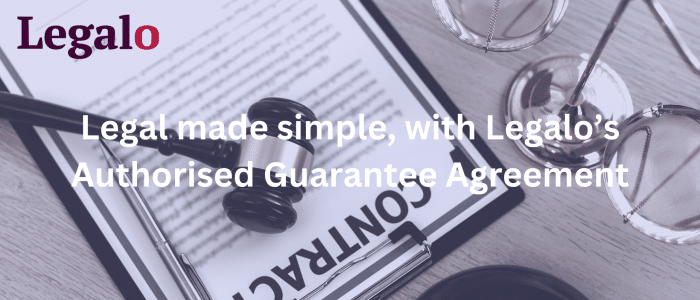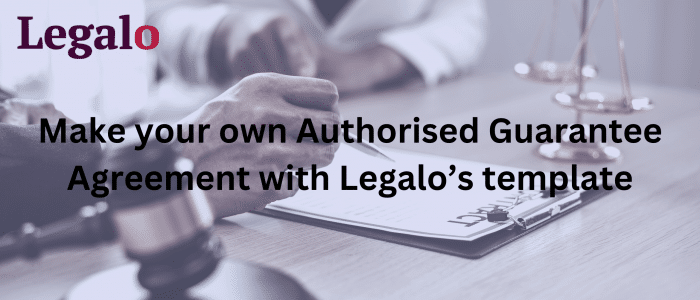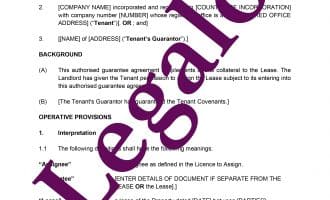Authorised Guarantee Agreement
Our Authorised Guarantee Agreement template:
- easy to use and reliable
- drafted by an expert UK lawyer
- guidance notes in plain English
- cost-effective peace of mind

How Does It Work?
-
1. Download
-
2. Edit
-
3. Print
-
4. Sign
This is our Authorised Guarantee Agreement template (or AGA). Use it when you want to transfer an existing commercial lease of a property in England or Wales. This is not for use with property based in Scotland.
When to use this AGA template
An Authorised Guarantee Agreement is needed for the assignment of the remainder of the term of a lease of business premises to a new tenant – “the assignee” – if the lease is classed as a new lease under the Landlord and Tenant (Covenants) Act 1995. This is normally any lease that a landlord granted on or after 1 January 1996.
This Authorised Guarantee Agreement template will ensure you can put in place a robust and detailed agreement. It is suitable where you either do not have an agreed form of AGA from the lease, or you do not want to use that one. You can customise it to suit your individual requirements.
David, our co-founder and solicitor of more than twenty years, drafted this template. This ensures that you can rely on the document being up-to-date and legally comprehensive.
Our detailed guidance notes (free with the Authorised Guarantee Agreement template) make adapting the AGA easy and quick. A summary of the guidance notes are available here: guide to this Authorised Guarantee Agreement template.

Using our Authorised Guarantee Agreement template
Download this AGA template in Word format once purchased. Following our free guide, you can then edit it to suit your own needs.
To ensure customer satisfaction, we provide a full money-back guarantee. So if you are not happy with your purchased template for any reason, just get in touch.
Once purchased, you can reuse the template as many times as you want for creating Authorised Guarantee Agreements at no further cost.
We regularly review our templates to keep them up-to-date. When we update a template that you have bought, we will notify you by email and you will get a free updated template.
Assignment of a lease – the full suite of templates
If you need the full batch of documents for the assignment of a lease, and not just the authorised guarantee agreement, then we offer 25% off when you buy them all at the same time using our discount package. Click here for more details.
Click the link to see the full range of commercial property documents we offer.

FAQs for an Authorised Guarantee Agreement
Below we’ve answered the top questions from the Internet about this topic.
What is an Authorised Guarantee Agreement?
An Authorised Guarantee Agreement is a legal contract that the landlord and tenant use in the UK when assigning the remaining terms of a modern commercial lease. That is a lease that a landlord granted on or after 1 January 1996. When a tenant assigns their lease to a new tenant, the outgoing tenant enters into an Authorised Guarantee Agreement. Under the AGA, the outgoing tenant guarantees the performance of the incoming tenant’s lease obligations. In the case of a default from the new tenant, the landlord can hold the outgoing tenant responsible for fulfilling those responsibilities, such as the payment of rent and service charges. So this document provides added security for the landlord in commercial lease arrangements. If the outgoing tenant does not agree to sign the AGA, the landlord will not consent to the assignment of the lease to the new tenant.
What is the difference between a guarantee and an Authorised Guarantee Agreement?
A guarantee is where one party assures the performance of another party’s obligations, but it could apply to any situation. An Authorised Guarantee Agreement is a specific type of guarantee that people use only in the case of the assignment of commercial leases in the UK. So the Authorised Guarantee Agreement is a more specialised form of guarantee for one specific situation regarding commercial leases.
What is the effect of an Authorised Guarantee Agreement?
An Authorised Guarantee Agreement holds the outgoing tenant of a commercial lease liable for the incoming tenant’s compliance with the terms of the lease. If the incoming tenant fails to meet any lease obligation, the landlord can seek remedies from the outgoing tenant. So this offers added security for the landlord. It effectively extends the outgoing tenant’s liability long after they’ve assigned the lease to a new tenant, providing assurance to the landlord that the new tenant will honour the lease terms .
When can a landlord require an AGA?
A landlord can require an Authorised Guarantee Agreement when a tenant wishes to assign their commercial lease to a new tenant. In the UK, it is standard practice to include an AGA clause in commercial lease agreements, allowing landlords to ask that the outgoing tenant guarantees the performance of the incoming tenant, protecting their interests after the current tenant has vacated the property. If the new tenant is financially weaker, then this means the landlord does not damage its position by allowing the assignment.
Can a landlord insist on an AGA?
Yes, a landlord in the UK can insist on an Authorised Guarantee Agreement when a tenant wishes to assign their commercial lease. Commercial leases commonly specify that when a tenant wishes to assign the remaining term of the lease it must sign an AGA, allowing landlords to require this form of guarantee as a condition for approving the assignment of the lease.
Who signs an Authorised Guarantee Agreement?
The outgoing tenant (assignor) usually signs the Authorised Guarantee Agreement and, if applicable, any guarantors associated with the outgoing tenant, along with the landlord. These signatures ensure that the terms of the AGA are clear and the parties have understood them, making the contract legally enforceable.
It is essential that any guarantee is in writing in order for it to be enforceable. This is because of section 4 of the Statute of Frauds 1677.
What is a licence to assign with an AGA?
A “licence to assign with an AGA” are two separate legal documents:
- the licence to assign: by which a landlord grants permission to a tenant, allowing them to transfer their lease to a new tenant, and
- the AGA: the assignment is subject to the condition that the outgoing tenant enters into an AGA.
This arrangement provides a level of assurance to the landlord, while permitting the lease assignment to proceed.
Is an AGA legally binding?
Yes, an Authorised Guarantee Agreement is legally binding in the United Kingdom. It is a legally enforceable contract once signed by all relevant parties, under which a breach of the lease by the new tenant can lead to legal action from the landlord against the outgoing tenant to enforce the guarantee.
How can a guarantor protect themselves?
In order to protect themselves in regards to an agreement such as an Authorised Guarantee Agreement, a guarantor must:
- be sure that they understand the terms of the agreement; and
- assess whether they will be able to meet these terms financially.
This can involve seeking legal advice, reviewing and scrutinising the contract, or checking the financial strength of the in-coming tenant. There is not a lot more an out-going tenant can do in an AGA situation. The landlord is the one in the strongest negotiating position.
What are the three 3 types of guarantees?
Three common categories of guarantees are:
- Personal Guarantee: Involves an individual taking personal responsibility for the obligations of another party. People often use this in business loans, and residential tenancy agreements.
- Corporate Guarantee: A company guarantees the performance of another company or individual, typically in commercial contracts or financial transactions.
- Parent Company Guarantee: A parent company guarantees the obligations of its subsidiary company. This ensures that the subsidiary will fulfil its commitments. People often use this in corporate loan structures, to provide financial security to the lender.
An Authorised Guarantee Agreement might typically fall under the first or second category.
What is required for a guarantee to be legally enforceable?
You must meet a number of criteria in order to make a guarantee legally enforceable:
- Compliance with formalities: Any specific legal formalities required by the jurisdiction or the contract must be followed. For example, the contract being in writing (a fundamental requirement in the UK) and signed by all parties.
- Clear intent: The guarantor must show a clear intent to undertake the obligation, without any evidence of duress or misrepresentation.
- Consideration: There must be something of value (consideration) exchanged, often the benefit received by the party being guaranteed. This is not required if the guarantee is signed as a deed.
- Legal capacity: The guarantor must have the legal capacity to enter into the guarantee.
Under what circumstances does a guarantee become invalid?
There are several circumstances under which a guarantee may cease to be valid:
- Not in writing: the most common problem is where a guarantee has been given verbally, so it is not in writing. It is unenforceable for lack of evidence and under section 4 of the Statue of Frauds 1677.
- Non-fulfilment of conditions: If the guarantee’s conditions or terms are not met, it may become invalid.
- Contractual changes: If the underlying contract or agreement is altered without the guarantor’s consent, their obligation may no longer be valid.
- Release or discharge: If the guarantor is released from their duty through a legal process or agreement, the guarantee becomes invalid.
- Illegality: If the guaranteed obligation becomes illegal or unenforceable, the guarantee associated with it may also become invalid.
- Expiry: Sometimes a guarantee will have an expiry date or conditions that render it invalid after a certain period. This is most common when the obligation the guarantee is guaranteeing also expires after a certain period, for example a contractual warranty.



